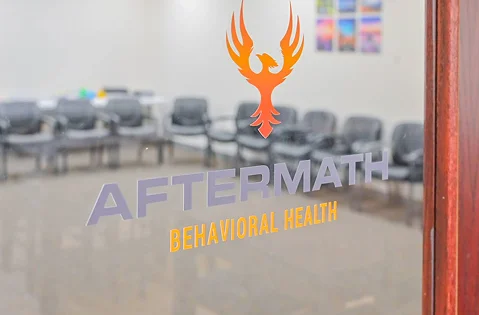Outpatient Mental Health Program Near Wakefield, MA
With Aftermath Behavioral Health, you can experience professional mental health support to help you achieve wellness. Our flexible outpatient programs deliver tailored, holistic care to meet you where you are.
Get Help Today
What Is Outpatient Mental Health Treatment?
Outpatient mental health treatment allows you to sleep at home and still receive quality support. You attend therapeutic sessions without needing any overnight, in-facility stays. Common sub-types of outpatient care include:
Psychiatric Day Treatment: Less intensive than inpatient, but still structured
Intensive Psychiatric Outpatient: Less frequent; time for other commitments
Regular Outpatient: For those who are stable and have a strong support system

Why Choose Aftermath Behavioral Health?
Client-Focused Care
We make plans that work for your life; we don’t use a one-size-fits-all approach.
Qualified Team
Our therapists have expert accreditations and years of experience.
Multi-Focus Approach
We treat mental health issues as well as co-occurring disorders together.
Times That Work for You
We have daytime, evening, and weekend times to fit around your daily routine.
Help Between Visits
We give you tools to use at home, keeping you connected during your healing.
Accessible Location
We’re near Wakefield and help people all over the Greater Boston area.
Our Outpatient Mental Health Services
We offer different types of support based on what you need. Our care includes:

Psychiatric Evaluation and Outpatient Psychiatry
Our doctors do full check-ups to see what you need. They make a plan that might include standard psychotherapies and wellness practices.

Medication Management and Psychopharmacology
If you need medicine, our staff can help create a suitable regimen. They change doses as needed based on your progress and side effects.

Individual Outpatient Therapy
Experience private, one-on-one sessions with one of our licensed mental health counselors. Here, you can learn ways to handle tough times.

Group Therapy and Support Groups
Meet with other people who understand what you’re going through. This builds a sense of community and teaches you new skills.

Crisis Intervention and Relapse Prevention
We’re here to help you navigate the particularly difficult moments. Our team helps you make a plan so you stay on the right path.
Who Can Benefit From Our Mental Health Outpatient Program
Our program helps many individuals, including:
Individuals whose mental health symptoms make daily life hard
People who can work and live at home but need extra support
Those whose doctor, therapist, or family thinks they should get help
People who decide on their own that they want help
Those moving from higher levels of care
You don’t have to be in a crisis to seek support. Many people manage ongoing mental health issues with our comprehensive services.


Conditions We Treat in Outpatient Care
We help people with many different mental health problems. The main ones include:
Panic attacks, social fears, worry, and phobias that mess with daily life
Feeling sad constantly, hopelessness, and mood changes affecting quality of life
Dealing with traumatic things that happened, flashbacks, and nightmares
Bipolar Disorder
Experiencing mood swings and manic or depressive times
Having thoughts you can’t stop and behaviors you repeat that cause stress
Struggles with attention, focus, and impulses at school, work, and more

Our Outpatient MH Program Structure
Most people come a few times each week for a few hours each visit. Programs usually last 3-12 months, but can be adjusted based on your needs.
Your week might include:
- Solo therapy sessions
- Group meetings with others
- Doctor visits for medicine checks
- Evening and weekend appointments so you don’t miss work or school
We track how you’re doing using different tools. Your care team includes therapists, doctors, and support staff who all work together to help you succeed.
Admission Criteria and Clinical Screening
We welcome questions about mental health from anyone and aim to guide people with various related problems. However, we can’t provide treatment for people who are very sick medically.
Our intake team can make sure our program fits what you need. If you’re unsure about the level of care that you need, we can help assess this during an introductory evaluation.

Insurances We Accept
We accept most major insurance providers, with the exception of Medicare and MassHealth.
FAQs on Outpatient Mental Health Care
How often is outpatient therapy?
Most people go once a week. Some go as frequently as they need to maintain their well-being. Your mental health counselor works with you to find the best schedule.
Is outpatient psychiatric treatment the same as therapy?
Outpatient treatment includes therapy, medication management, and skill-building. It typically combines various group, evidence-based, and holistic therapies.
How do I know if an outpatient program is right for me?
When mental health worries are bothering you, don’t wait to get help. If symptoms make daily life hard but you can still work and live at home, outpatient care might be perfect.
Do you offer telehealth services?
No, we don’t do video calls or phone sessions. All visits happen on-site in Boston, Massachusetts. Reach out to ask any further questions about our program options.
Start Your Journey to Mental Wellness Today
Aftermath Behavioral Health’s compassionate team is ready to help you answer any questions. It doesn’t matter where you are in your journey; we can provide the tailored care that you need. Through holistic, flexible outpatient programs, you or your loved one can achieve lasting wellness.









